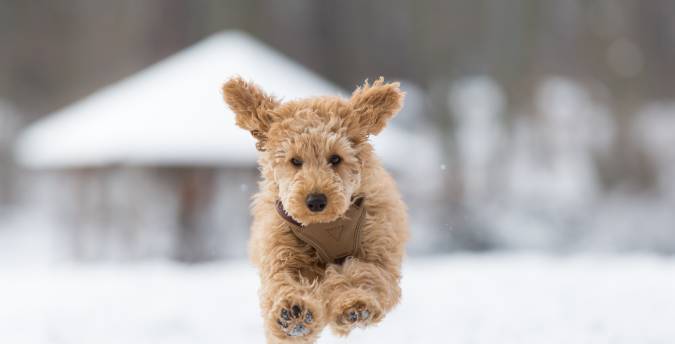Caring for Your Dog in the Winter

The winter weather can be brutal on you and your pet this time of year from snow, chilly winds, and low temperatures so your dog needs some TLC. Here are some tips if you’re taking your dog on daily outside activities or simply a short walk. Here are some starting points to keep your dog warm this winter:
WINTER COATS:
I’m not sure there’s anything more adorable than seeing a pup waddling down the street on their walk wearing a dog coat or dog sweater to keep them warm. While some dog breeds, like the Husky and the Newfoundland, have natural winter coats some dogs do not and need some extra fabric to stay warm. You want to focus not only on keeping them warm but maintaining their mobility as well. If your dog refuses jackets, you can invest in a heated dog bed for them to enjoy on those snowy nights. A dog with a natural thick winter coat needs to have its coat maintained with regular dog grooming and brushing to let the thicker fur grow in.
PAW CARE:
Dogs put a lot of wear and tear on their paws and they need to be properly maintained in the colder weather. There are winter dog boots that your pup can wear, but many dogs find them too disorienting and uncomfortable. If they won’t wear them, make sure to trim the hair on their paws, as wet hair can keep the paws damp even after they have come inside, but don’t cut the hair too short! Dogs in city environments may require a balm or Vaseline to soothe their paws from the salted sidewalks. If you don’t want to risk your dog licking Vaseline off their paws, you can have their paws cleaned regularly at a groomer.
PROTECT THEIR EARS:
If your dog likes to play in the snow or get caught in the rain on your daily walk, make sure to dry their ears when they come inside to prevent painful ear infections. Or you can put cute earmuffs on them to keep your pooch warm in the dreary weather.
AVOID SALT AND CHEMICALS:
During the winter months, salt and other chemicals cover the roads and sidewalks in an attempt to de-ice them. This may be convenient for us, but the salt and chemicals are bad for your dog’s paws and could be harmful if your dog accidentally ingests them on your daily walk or later on when they are licking their paws.
HYDRATE
Whether your dogs are layering up with puffy coats or have thicker fur than usual, they need to be drinking more water to keep their body temperature regulated. If your dog is drinking water outside or is mainly an outside dog, make sure they are drinking from a plastic dog bowl as a metal bowl freezes and could harm your dog’s tongue and mouth.
LIMIT TIME OUTDOORS
While your dog may be perfectly content running around in the cold weather for hours, they need to be brought inside regularly to keep warm and prevent frostbite on their paws. Consider moving your pup inside from their outdoor dog kennel during the winter months. You can always buy them a new plushie or ball to keep them occupied inside.
These suggestions for winter care for your pet are just the tip of the iceberg and not every recommendation may be right for your dog. Find out what works best for your breed and specific dog to make sure they are happy and healthy this winter season.
